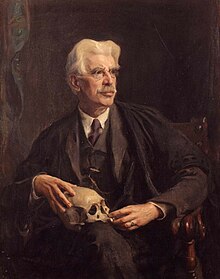
Back الفريد كورت هادون ARZ آلفرد کرت هدون AZB Alfred C. Haddon German آلفرد کرت هدون Persian Alfred Cort Haddon French Alfred Cort Haddon Irish Alfred Cort Haddon Italian Alfred Cort Haddon JV Alfred Cort Haddon Dutch Alfred Cort Haddon NB
Alfred Cort Haddon | |
|---|---|
 Haddon by Philip de László, 1925 | |
| Born | 24 May 1855 |
| Died | 20 April 1940 (aged 84) |
| Nationality | British |
| Alma mater | Christ's College, Cambridge |
| Children | Kathleen, 1 other daughter and 1 son |
| Scientific career | |
| Fields | Anthropology |
Alfred Cort Haddon, Sc.D., FRS,[1] FRGS FRAI (24 May 1855 – 20 April 1940) was an influential British anthropologist and ethnologist. Initially a biologist, who achieved his most notable fieldwork, with W. H. R. Rivers, Charles Gabriel Seligman and Sidney Ray on the Torres Strait Islands. He returned to Christ's College, Cambridge, where he had been an undergraduate, and effectively founded the School of Anthropology. Haddon was a major influence on the work of the American ethnologist Caroline Furness Jayne.[2]
In 2011, Haddon's 1898 The Recordings of the Cambridge Anthropological Expedition to Torres Straits were added to the National Film and Sound Archive of Australia's Sounds of Australia registry.[3] The original recordings are housed at the British Library[4] and many have been made available online.[5]
- ^ Fleure, H. J. (1941). "Alfred Cort Haddon. 1855–1940". Obituary Notices of Fellows of the Royal Society. 3 (9): 448–65. doi:10.1098/rsbm.1941.0014. S2CID 191490709.
- ^ Jayne, Caroline Furness; Haddon, Alfred C. (1906). String figures: a study of cat's-cradle in many lands. New York: Charles Scribner's Sons.
- ^ National Film and Sound Archive: The Recordings of the Cambridge Anthropological Expedition to Torres Straits on the Sounds of Australia registry, nfsa.gov.au. Retrieved 20 December 2017.
- ^ "World and traditional music: wax cylinder collections". bl.uk. Retrieved 20 December 2017.
- ^ "Ethnographic wax cylinders". bl.uk. Retrieved 20 December 2017.